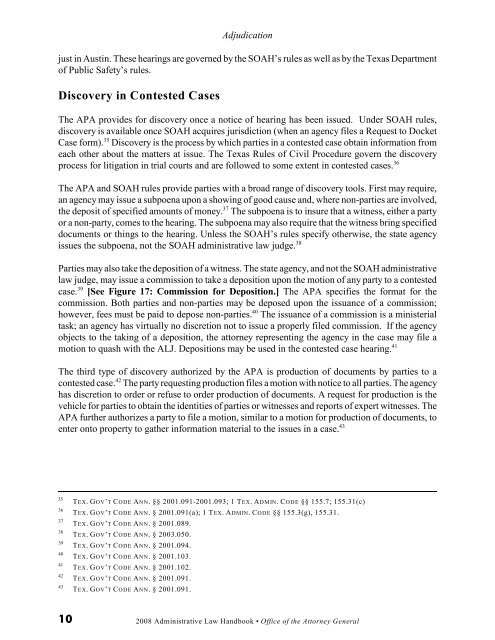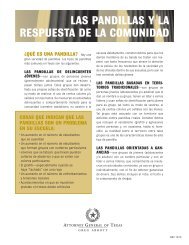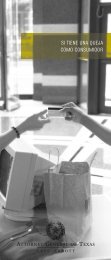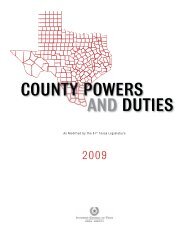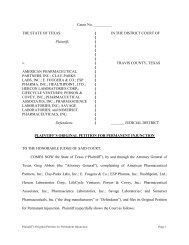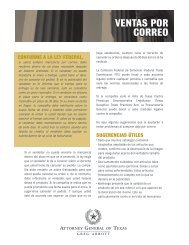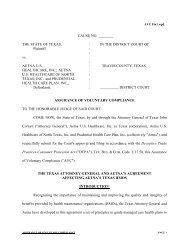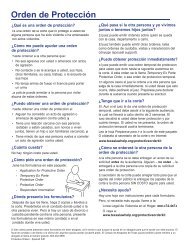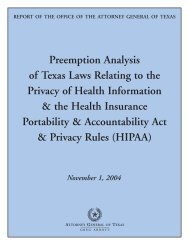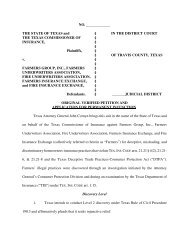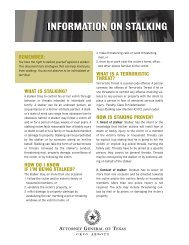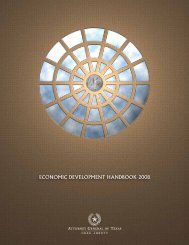Administrative Law Handbook - Texas Attorney General
Administrative Law Handbook - Texas Attorney General
Administrative Law Handbook - Texas Attorney General
Create successful ePaper yourself
Turn your PDF publications into a flip-book with our unique Google optimized e-Paper software.
Adjudication<br />
just in Austin. These hearings are governed by the SOAH’s rules as well as by the <strong>Texas</strong> Department<br />
of Public Safety’s rules.<br />
Discovery in Contested Cases<br />
The APA provides for discovery once a notice of hearing has been issued. Under SOAH rules,<br />
discovery is available once SOAH acquires jurisdiction (when an agency files a Request to Docket<br />
35<br />
Case form). Discovery is the process by which parties in a contested case obtain information from<br />
each other about the matters at issue. The <strong>Texas</strong> Rules of Civil Procedure govern the discovery<br />
process for litigation in trial courts and are followed to some extent in contested cases. 36<br />
The APA and SOAH rules provide parties with a broad range of discovery tools. First may require,<br />
an agency may issue a subpoena upon a showing of good cause and, where non-parties are involved,<br />
37<br />
the deposit of specified amounts of money. The subpoena is to insure that a witness, either a party<br />
or a non-party, comes to the hearing. The subpoena may also require that the witness bring specified<br />
documents or things to the hearing. Unless the SOAH’s rules specify otherwise, the state agency<br />
38<br />
issues the subpoena, not the SOAH administrative law judge.<br />
Parties may also take the deposition of a witness. The state agency, and not the SOAH administrative<br />
law judge, may issue a commission to take a deposition upon the motion of any party to a contested<br />
39<br />
case. [See Figure 17: Commission for Deposition.] The APA specifies the format for the<br />
commission. Both parties and non-parties may be deposed upon the issuance of a commission;<br />
40<br />
however, fees must be paid to depose non-parties. The issuance of a commission is a ministerial<br />
task; an agency has virtually no discretion not to issue a properly filed commission. If the agency<br />
objects to the taking of a deposition, the attorney representing the agency in the case may file a<br />
motion to quash with the ALJ. Depositions may be used in the contested case hearing. 41<br />
The third type of discovery authorized by the APA is production of documents by parties to a<br />
42<br />
contested case. The party requesting production files a motion with notice to all parties. The agency<br />
has discretion to order or refuse to order production of documents. A request for production is the<br />
vehicle for parties to obtain the identities of parties or witnesses and reports of expert witnesses. The<br />
APA further authorizes a party to file a motion, similar to a motion for production of documents, to<br />
enter onto property to gather information material to the issues in a case. 43<br />
35<br />
36<br />
37<br />
38<br />
39<br />
40<br />
41<br />
42<br />
43<br />
TEX. GOV’T CODE ANN. §§ 2001.091-2001.093; 1 TEX. ADMIN. CODE §§ 155.7; 155.31(c)<br />
TEX. GOV’T CODE ANN. § 2001.091(a); 1 TEX. ADMIN. CODE §§ 155.3(g), 155.31.<br />
TEX. GOV’T CODE ANN. § 2001.089.<br />
TEX. GOV’T CODE ANN. § 2003.050.<br />
TEX. GOV’T CODE ANN. § 2001.094.<br />
TEX. GOV’T CODE ANN. § 2001.103.<br />
TEX. GOV’T CODE ANN. § 2001.102.<br />
TEX. GOV’T CODE ANN. § 2001.091.<br />
TEX. GOV’T CODE ANN. § 2001.091.<br />
10<br />
2008 <strong>Administrative</strong> <strong>Law</strong> <strong>Handbook</strong> • Office of the <strong>Attorney</strong> <strong>General</strong>


